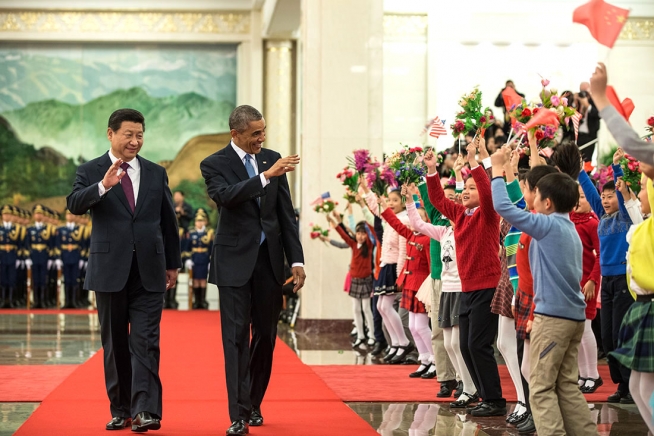
Despite the Fellini-esque excitement that swept the American capital over Pope Francis’s first-ever trip to the United States, it’s the arrival of China’s president, Xi Jinping (习近平), this week that will have the broader impact on global affairs.![]()
![]()
While the pope invoked human rights when he spoke about the environment in spiritual terms at the United Nations General Assembly Friday morning, Xi was preparing to announce that China would initiate in 2017 its own national cap-and-trade program, giving teeth to a pledge for carbon emissions in the world’s most populous country to peak in 2030, declining thereafter, part of an ambitious bilateral agreement signed between the United States and China last year.
It’s hard to think of two actors in international affairs who reside more starkly on the spectrum of ‘soft power’ and ‘hard power’ more than the two men who visited Washington this week. Francis, nominally the head of a country of less than 500 residents and 110 acres, leads a church with over 1.2 billion members, and he carries the moral authority with Catholicism’s believers to influence everything from LGBT rights to immigration reform. But Xi, as the leader of a country with 1.3 billion people, wields the political, military and economic power that comes from controlling the world’s largest economy and military force.
For all the talk about Francis’s ability to deploy soft power with tactical skill, it is Xi’s hard power that is setting the agenda for climate change policy around the world, and the dual contrast on Friday revealed the limits of soft power. There’s no indication that Francis’s exhortations have made any difference on the willingness of the Chinese government to embrace transformative environmental policy.
What’s more, Xi’s increasingly progressive stand on climate change isn’t driven by the desire for international praise or even necessarily the merits of a policy that will reduce global emissions, but by hard domestic politics. In a one-party state, the Chinese Communist Party knows that it ‘owns’ every problem in China (there’s no alternative Democratic or Republican Party it can blame), so Xi knows that his government has to be seen as doing something to ameliorate his country’s crippling and health-threatening pollution. Continue reading Xi’s hard power trumps papal soft power on climate change
